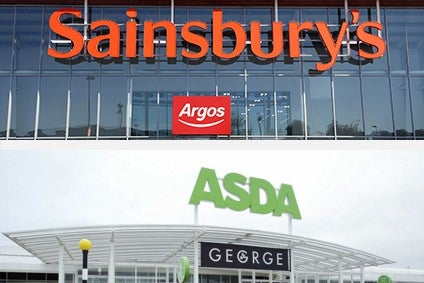
UK supermarkets Tesco and Morrisons have questioned the logic behind the proposed merger of rivals Sainsbury’s and Asda.
If approved amid an enquiry launched by the country’s competition watchdog, the deal would see the UK’s so-called big four supermarkets whittled down to three, with Tesco losing its current top spot, even though Sainsbury’s and Asda have pledged to continue to operate independently.

Discover B2B Marketing That Performs
Combine business intelligence and editorial excellence to reach engaged professionals across 36 leading media platforms.
Presenting its case to the UK’s Competition and Markets Authority, Tesco said “the proposed merger is a ‘four-to-three’ deal that would not be approved without extensive remedies under existing precedent”, according to a transcript of the supermarket’s presentation at the CMA’s November hearing.
Morrisons might be the most likely candidate within the big four to feel most of the impact, along with other smaller supermarket chains, given that Tesco increased its weight earlier last year with the purchase of US wholesaler Booker.
In its testimony to the CMA, Morrisons was reported as saying: “The proposed merger will result in the creation of an effective duopoly formed by Tesco and the merged entity, as they will be controlling in excess of 60% of the market.”
It added: “If as a result of the merger, the merging parties are seen as being an important trading partner for suppliers, because of their scale, it could mean that other grocery retailers, such as Morrisons, are disadvantaged in other ways as a result (through supply shortages during periods of high demand as suppliers focus on serving the largest retailers first, for example). The fact that there would be two grocery retailers of approximately the same size as Tesco is now, could exacerbate this issue for smaller supermarkets.”

US Tariffs are shifting - will you react or anticipate?
Don’t let policy changes catch you off guard. Stay proactive with real-time data and expert analysis.
By GlobalDataTesco also questioned the reasoning behind the deal if the two parties continue to run separate businesses.
“The proposed merger does not appear to give rise to volume opportunity because suppliers are already supplying both merging parties; there does not appear to be any growth opportunity because it is a merger of two similar businesses; and there does not appear to be any efficiency because the parties plan to continue to run the two businesses separately, with separate brands and propositions, and already have national distribution in both companies,” according to the transcript of Tesco’s testimony.
Morrisons, meanwhile, also highlighted the same issue and asked how the merger would give rise to lower retail prices – which it said would normally be the logic if business growth leads to increased volumes for suppliers and hence cheaper prices – if the merger parties retain the current status quo.
The supermarket also focused on the risks to manufacturers and end suppliers alike, and the threat some retailers may face from having to possibly exit certain products categories as they get pushed out of the market.
“To the extent that the merging parties are able to drive purchase prices down and squeeze suppliers further, those suppliers are likely to react and to seek to recover the loss in profitability through other means (through their own raw material suppliers, price increases on other products/to other retailers, or by exiting the market), which could affect the future relationship that Morrisons has with those suppliers,” Morrisons was quoted as saying.
Tesco said that without any growth opportunity or efficiencies to offer from the planned merger, branded suppliers would not be interested in reducing their prices. It also noted that Sainsbury’s and Asda are not proposing to make any large-scale changes in operating cost savings.
“The proposed merger is a challenge in terms of economics, as there are few direct customer benefits,” according to Tesco’s transcript. “Nearly all of the announced efficiencies rely on harmonising costs and prices from suppliers and that this is a big ask when the merging parties do not appear to be able to offer suppliers very much in return.”
just-food analysis: What does the Sainsbury’s-Asda merger mean for food suppliers



